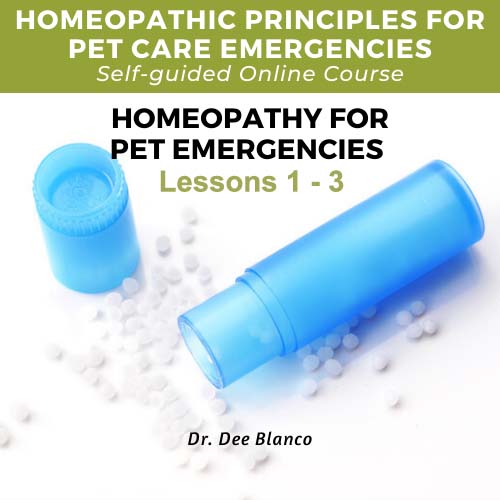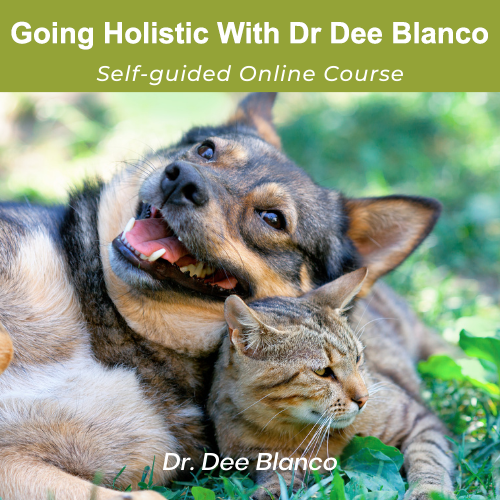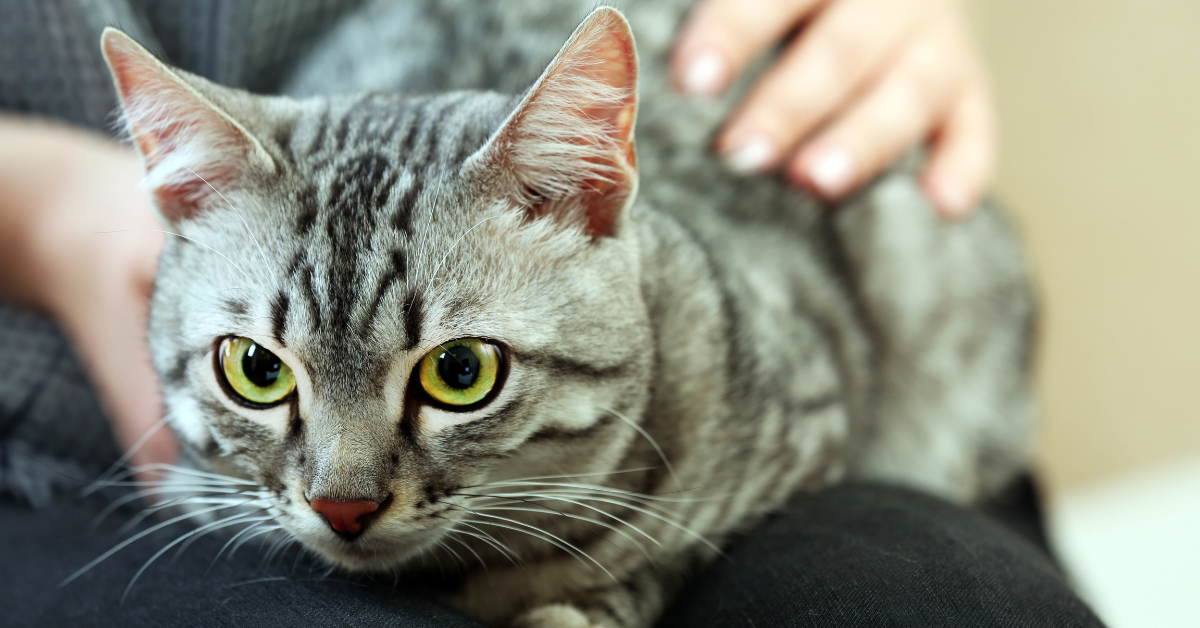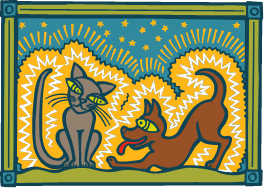Is this your sweet little kitty when you let him know you have to take him to the v-e-t?
Does he intuit your thoughts and disappear into the 'cat parallel universe' that mere humans cannot see through????
No wonder they resist your efforts to haul them to the vet. That's where awful things happen. That's where they are certainly not the predator, but, the prey.
Even at my office, equipped with soft fabric on top of a padded table, I'm still a v-e-t! It's still a horrible, humiliating, and overstimulating assault to the kitty perspective and energetic body. It's still people they don't know or trust. And, it still smells awful!
Thank goodness, or anyone else you want to thank, for Homeopathic remedies for dogs and cats!
Before you head out to visit the vet, remember that Homeopathic Aconitum napellus (Aconite for short) might be your pet's best friend when feeling stressed.
Aconite is the perfect homeopathic remedy when anyone, any species, experiences great fear, especially if combined with anxiety.
Here are some specific symptoms signaling the potential need for an Aconite homeopathic pet remedy - see if your animal fits:
- Great, noticeable fears: crowds, strangers, new situations, noises, smells, lights, etc.
- Inconsolable anxiety, panic attacks
- Restlessness
- Forebodings of impending events (this is where cats excel)
- Oversensitive to light, noise
- Intense pains
There are a number of Homeopathic remedies that can help make the vet visit less stressful on everyone, but Aconite is at the top of my list. You might need a dose yourself!
Make sure to dose your pet with this homeopathic remedy once before leaving the house and again while in the waiting room.
Aconite is the number one remedy for any type of shock. Your animal might feel suddenly shocked to be taken to the vet, or have a sudden illness that is, in itself, shocking. Additionally, any type of accident will have a shock component and Aconite could be helpful.
Aconite could make all the difference between a calm, stress-free vet visit, and a terror-filled, never-forgotten event.
Always have Aconite in your emergency pet homeopathic remedy kit - it will serve you well.
To discover more ways to use homeopathy for your animal's emergencies, check out my HOMEOPATHY FOR PET EMERGENCY course. Grab a kit if you don't have one!

Have Aconite and 49 More Remedies Ready for Pet Emergencies
Rather than be faced with your own anxiety of what to do in a traumatic situation with your pets, have the most commonly helpful homeopathic remedies on-hand.Price: $250










8 comments
Cynthia
A friend has a cat who is now 12, and was rescued as a kitten. However she was never able to pet the cat, and she just came to “kiss” her hands and that’s all. She eats, plays with the other cat. Would Aconitum be a good match?
———
Dr Dee Blanco replied:
Yes, you can try it.
Sometimes if a cat is that old then Aconite won’t help much, maybe a tiny bit. Or it could be just a temporary relief, but it’s worth a try.
A friend has a cat who is now 12, and was rescued as a kitten. However she was never able to pet the cat, and she just came to “kiss” her hands and that’s all. She eats, plays with the other cat. Would Aconitum be a good match?
———
Dr Dee Blanco replied:
Yes, you can try it.
Sometimes if a cat is that old then Aconite won’t help much, maybe a tiny bit. Or it could be just a temporary relief, but it’s worth a try.
Christy
Greetings and thank your for the opportunity to ask a question.
Our 5 yr old Border Collie, Martin, recently chocked while eating his “raw meaty bones”. He is now anxious about chewing the bones, especially the larger ones. (All are turkey necks cut into 1 1/2 to 2" pieces so easily manageable. He’s also been on a raw diet his entire life tho has only been with us for 1 1/2 years. Another layer is that his original owner died from an aggressive form of cancer that took her quickly. Martin was then placed with two prospective owners before coming to us. He has bonded to me quickly and grown closer and closer to my patient husband as well. We are both very active with him which he enjoys and he always seek to stay near us.)
Martin additionally is highly sensitive to low frequencies (thunder, loud muffler/car noises, some but not all machinery) and loud crowd noises.
He does not prefer close physical affection but will briefly tolerate. This is similar for times I need to administer care ie giving him a remedy.
A friend suggested getting Aconitum Napellus 1m to have on hand… and so a couple of meals of seeing him start to decline the bone portion of his food after the coking experience, I created a wet remedy by added 3 pellets to 10 ml sterile bottle of Reverse osmosi water, succussed it 3-5 times and gave it to him 15 mins before giving his dinner last night. He ate all this food with only a very brief hesitancy to eat the last bone… coming to me for reassurance and then returned immediately and finished eating.
This morning, I gave him the same remedy tho succussed it as much as 6-10 times, waited 15 mins and then offered him his food. He ate the soft, ground portion but left 3 small bones on his plate and has yet to return, an hour later. (In the past, he would leave a bone or two on his plate but then return to eat them when I had left the area.)
Update… my husband just came in to discuss something and, during that time, Martin left the room and went and ate all of the bones left on his pate. I am making a point of being “nonchalant” with his not eating, not talking at all to him about it … but Martin is super sensitive and intuitive so there’s that….)
And so my question is, can you give me some guidance as to what to do moving forward?
Most appreciative, Christy
———
Dr Dee Blanco replied:
Christy,
I don’t think this situation is just an Aconite pattern. You can try it and see how/if it helps, but it might be better to go back to the loss of his original owner who died. His placement in different homes, relocations, separation, etc, could be at the center of this issue, which could correct a digestive issue as well.
There are many remedies that might help and I can only suggest a general grief remedy, but if that doesn’t help you really should work specifically with a homeopathic vet to find a constitutional or deeper acting remedy.
Try Ignatia amara for a few days and see if that helps little Martin. It probably will.
Best, Dr Dee
Greetings and thank your for the opportunity to ask a question.
Our 5 yr old Border Collie, Martin, recently chocked while eating his “raw meaty bones”. He is now anxious about chewing the bones, especially the larger ones. (All are turkey necks cut into 1 1/2 to 2" pieces so easily manageable. He’s also been on a raw diet his entire life tho has only been with us for 1 1/2 years. Another layer is that his original owner died from an aggressive form of cancer that took her quickly. Martin was then placed with two prospective owners before coming to us. He has bonded to me quickly and grown closer and closer to my patient husband as well. We are both very active with him which he enjoys and he always seek to stay near us.)
Martin additionally is highly sensitive to low frequencies (thunder, loud muffler/car noises, some but not all machinery) and loud crowd noises.
He does not prefer close physical affection but will briefly tolerate. This is similar for times I need to administer care ie giving him a remedy.
A friend suggested getting Aconitum Napellus 1m to have on hand… and so a couple of meals of seeing him start to decline the bone portion of his food after the coking experience, I created a wet remedy by added 3 pellets to 10 ml sterile bottle of Reverse osmosi water, succussed it 3-5 times and gave it to him 15 mins before giving his dinner last night. He ate all this food with only a very brief hesitancy to eat the last bone… coming to me for reassurance and then returned immediately and finished eating.
This morning, I gave him the same remedy tho succussed it as much as 6-10 times, waited 15 mins and then offered him his food. He ate the soft, ground portion but left 3 small bones on his plate and has yet to return, an hour later. (In the past, he would leave a bone or two on his plate but then return to eat them when I had left the area.)
Update… my husband just came in to discuss something and, during that time, Martin left the room and went and ate all of the bones left on his pate. I am making a point of being “nonchalant” with his not eating, not talking at all to him about it … but Martin is super sensitive and intuitive so there’s that….)
And so my question is, can you give me some guidance as to what to do moving forward?
Most appreciative, Christy
———
Dr Dee Blanco replied:
Christy,
I don’t think this situation is just an Aconite pattern. You can try it and see how/if it helps, but it might be better to go back to the loss of his original owner who died. His placement in different homes, relocations, separation, etc, could be at the center of this issue, which could correct a digestive issue as well.
There are many remedies that might help and I can only suggest a general grief remedy, but if that doesn’t help you really should work specifically with a homeopathic vet to find a constitutional or deeper acting remedy.
Try Ignatia amara for a few days and see if that helps little Martin. It probably will.
Best, Dr Dee
Robbie
So is Aconitum Napellus the same as Aconite?
———
Dr Dee Blanco replied:
Yes, the same. We just say ‘Aconite’ as an abbreviated version.
So is Aconitum Napellus the same as Aconite?
———
Dr Dee Blanco replied:
Yes, the same. We just say ‘Aconite’ as an abbreviated version.
Dibyendu Bhattacharyya
Dear Doctor
I have 3 male cats, all strays. The eldest one is approx 4 years old. 02 others are brothers approx 2 years old. Eldest one and one of the brother are neuterd. The eldest one was getting along very well with other 2 until a few days back and now the behavior has changed 180 degrees. He is very stressed and anxious. Running away from home, hiding under table, not responding when called, reduced appetite etc. I live in a one bedroom apartment with my mom and these cats. What homeo remedy can be applied? Shall appreciate your kind suggestions. Kind regards
———
Dr Dee Blanco replied:
Hello!
First of all, I think you have too many male cats in a small home. That’s a big red flag for stressing out cats who are territorial by nature. And if you have anyone that is still intact that will create fear, anxiety and disharmony.
If you are going to keep the dynamic as such you may or may or may not be able to change behavior without neutering. I think if they are over 2 yrs old you can neuter without too much risk of health problems, except maybe the gums/teeth. But, if you are going to rescue cats and put them in a small enclosure that is not natural either. We all do these things with the best of intentions.
You can try rescue remedy. But, try Aconite 200C, once daily for 3 days or even more often, but you should see a change within 3 days. Or maybe Staphisagria. There are lots of remedies, such as Pulsatilla, too, but I can’t say more without knowing more details.
Hope this helps!
Dear Doctor
I have 3 male cats, all strays. The eldest one is approx 4 years old. 02 others are brothers approx 2 years old. Eldest one and one of the brother are neuterd. The eldest one was getting along very well with other 2 until a few days back and now the behavior has changed 180 degrees. He is very stressed and anxious. Running away from home, hiding under table, not responding when called, reduced appetite etc. I live in a one bedroom apartment with my mom and these cats. What homeo remedy can be applied? Shall appreciate your kind suggestions. Kind regards
———
Dr Dee Blanco replied:
Hello!
First of all, I think you have too many male cats in a small home. That’s a big red flag for stressing out cats who are territorial by nature. And if you have anyone that is still intact that will create fear, anxiety and disharmony.
If you are going to keep the dynamic as such you may or may or may not be able to change behavior without neutering. I think if they are over 2 yrs old you can neuter without too much risk of health problems, except maybe the gums/teeth. But, if you are going to rescue cats and put them in a small enclosure that is not natural either. We all do these things with the best of intentions.
You can try rescue remedy. But, try Aconite 200C, once daily for 3 days or even more often, but you should see a change within 3 days. Or maybe Staphisagria. There are lots of remedies, such as Pulsatilla, too, but I can’t say more without knowing more details.
Hope this helps!
Ana Alonso
Dear doctor!
My rescued cat has attacked few times.
Every time he smells the scent of another cat, he attacked us severely.
Maybe he feels threatened that he’s going to be replaced.
And becomes very aggressive towards my other female cat too.
I gave him phosphorus because he had diarrhea too and worked and was more relaxed But today a visitor who has a cat sniffed her and begun again aggressive towards my cat and he’s very skeptical and thinks I’m hidin a cat. He sniffs the house like a police patrol.
What can I do?
———
Dr Dee Blanco replied:
Hello Ana,
Without a consult to find out more details you could try the Aconite dosing. Or also homeopathic Staphisagria for the cat that is indignant. Or Lachesis for the jealous one.
Good luck!
Dear doctor!
My rescued cat has attacked few times.
Every time he smells the scent of another cat, he attacked us severely.
Maybe he feels threatened that he’s going to be replaced.
And becomes very aggressive towards my other female cat too.
I gave him phosphorus because he had diarrhea too and worked and was more relaxed But today a visitor who has a cat sniffed her and begun again aggressive towards my cat and he’s very skeptical and thinks I’m hidin a cat. He sniffs the house like a police patrol.
What can I do?
———
Dr Dee Blanco replied:
Hello Ana,
Without a consult to find out more details you could try the Aconite dosing. Or also homeopathic Staphisagria for the cat that is indignant. Or Lachesis for the jealous one.
Good luck!
Susan
Hello, this is really interesting. I have had a rescue cat for two yrs, don’t know his history. About once or twice a month he starts acting terrified. Staring at things I don’t see, growling at them and physically shaking. It’s very hard to calm him down and it usually only lasts a day or two until the next time. He getsxwide pupils and the is really scared by the slightest noise. He’s fine all other times. Not sure uf it’s the moon or 5g frequencies as lots of towers are around here. Do you think aconite would help? I only have 30c aconite that i use myself, would this be OK for him?
———
Dr Dee Blanco replied:
Yes, you can use the Aconite 30C you use for yourself, but it is for more acute frights such as going to the vet. For over-sensitivities to EMF’s, noises, etc. require a more nuanced approach to your specific cat.
Try the Aconite during a super scary time – might need to repeat it a few times within an hour.
Hello, this is really interesting. I have had a rescue cat for two yrs, don’t know his history. About once or twice a month he starts acting terrified. Staring at things I don’t see, growling at them and physically shaking. It’s very hard to calm him down and it usually only lasts a day or two until the next time. He getsxwide pupils and the is really scared by the slightest noise. He’s fine all other times. Not sure uf it’s the moon or 5g frequencies as lots of towers are around here. Do you think aconite would help? I only have 30c aconite that i use myself, would this be OK for him?
———
Dr Dee Blanco replied:
Yes, you can use the Aconite 30C you use for yourself, but it is for more acute frights such as going to the vet. For over-sensitivities to EMF’s, noises, etc. require a more nuanced approach to your specific cat.
Try the Aconite during a super scary time – might need to repeat it a few times within an hour.
Christina Lucas
Semi feral cat I had neutered (wish I hadnt) has developed a terrible oozing swelling and he keeps
licking it. Vet thinks it could be cancer. I’ve had to take him in and keep him in small bedroom.
He’s ruined the carpet trying to get out and I’m at my wits end with him constantly howling.
I don’t see the vet until next week and quite honestly afraid to leave him in case he trashes the
Place. He’s a huge boy and very loving but used to living outside. He’s roaming free at the moment
but when awake paces and howls x
———
Dr Dee Blanco replied:
Christina,
You need to see your vet and determine what is going on. But, it could be an abscess. Homeopathic Silicea would help if it is.
Semi feral cat I had neutered (wish I hadnt) has developed a terrible oozing swelling and he keeps
licking it. Vet thinks it could be cancer. I’ve had to take him in and keep him in small bedroom.
He’s ruined the carpet trying to get out and I’m at my wits end with him constantly howling.
I don’t see the vet until next week and quite honestly afraid to leave him in case he trashes the
Place. He’s a huge boy and very loving but used to living outside. He’s roaming free at the moment
but when awake paces and howls x
———
Dr Dee Blanco replied:
Christina,
You need to see your vet and determine what is going on. But, it could be an abscess. Homeopathic Silicea would help if it is.
Laura Chick
Hello, my one cat Alby has stress issues, but 2 months ago he started aggressively attacking his tail. Started out of nowhere. He is currently on a great cbd oil, subdue internal wind and a digestive Chinese herb. I have had him to 4 vets, one holistic, the herbs seem to be helping, but he still will attack tail intermittently. Is there anything else I can do for him? Thank you
———
Dr Dee Blanco replied:
You might want to go back to your records and determine if you gave him vaccines in the last year, especially in the last 3 months.
Cats are often vaccinated in the tail (OMG!!) now because there were injection site sarcomas (cancer) happening from some vaccines between the shoulder blades. So, it became a practice to vaccinate in the tail so if a tumor developed it could easily be amputated. Oh gosh!! Do you think we should be looking at what is in the vaccines that could be causing tumors to develop? Well, they have, and it’s common mindset that aluminum adjuvants are the causes of these tumors. But, that is only one toxicant in those vials. There are many more. Too many.
So, I would work with a homeopathic vet to see if you can help clear those toxicants. Please make sure you are on our newsletter because in the new year we hope to provide more support for these situations.
And frankly speaking, I would reconsider any vaccination again for this cat. You might want to read about antibody titers if you are worried about it.
I’ll be posted a couple articles on vaccines soon so stay posted!

Hello, my one cat Alby has stress issues, but 2 months ago he started aggressively attacking his tail. Started out of nowhere. He is currently on a great cbd oil, subdue internal wind and a digestive Chinese herb. I have had him to 4 vets, one holistic, the herbs seem to be helping, but he still will attack tail intermittently. Is there anything else I can do for him? Thank you
———
Dr Dee Blanco replied:
You might want to go back to your records and determine if you gave him vaccines in the last year, especially in the last 3 months.
Cats are often vaccinated in the tail (OMG!!) now because there were injection site sarcomas (cancer) happening from some vaccines between the shoulder blades. So, it became a practice to vaccinate in the tail so if a tumor developed it could easily be amputated. Oh gosh!! Do you think we should be looking at what is in the vaccines that could be causing tumors to develop? Well, they have, and it’s common mindset that aluminum adjuvants are the causes of these tumors. But, that is only one toxicant in those vials. There are many more. Too many.
So, I would work with a homeopathic vet to see if you can help clear those toxicants. Please make sure you are on our newsletter because in the new year we hope to provide more support for these situations.
And frankly speaking, I would reconsider any vaccination again for this cat. You might want to read about antibody titers if you are worried about it.
I’ll be posted a couple articles on vaccines soon so stay posted!